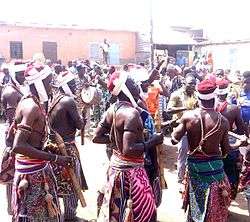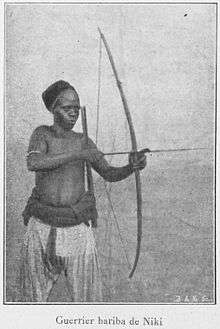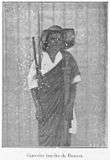Bariba people
 | |
| Total population | |
|---|---|
| c. 1.4 million | |
| Regions with significant populations | |
| 1,000,000 (2016)[1] | |
| 400,000 (2016) | |
| Languages | |
| Religion | |
| Related ethnic groups | |
| Bussa, Dendi, Yoruba | |
The Bariba people, self designation Baatonu (plural Baatombu), are the principal inhabitants of Borgou Department, Benin, and cofounders of the Borgu kingdom of what is now northeast Benin and west-central Nigeria. In Nigeria, they are found spread between western Kwara State and the Borgu section of Niger State. There are perhaps a million Bariba, 70% of them in Benin, where they are the fourth largest ethnic group and comprise approximately 1/11 of the population (9.2%).[2] The Bariba are concentrated primarily in the north-east of the country, especially around the city of Nikki, which is considered the Bariba capital.[3] They originally migrated from the area of Kwara State, Nigeria, and were renowned horsemen. One of their noted festivals is the annual Gani festival of which horseriding is a prominent element of.[3]
The Bariba people holds an important place in the history of the country. During the late 19th century, Baribawas known to constitute independent statesand dominate with kingdomsin cities like Nikki and Kandi in the northeast of the country. In the town of Pehunko there are approximately 200,000 Bariba people out of 365,000 inhabitants.[4]

The Bariba society consists of a higher-ranking official as chief of the town and their subordinates’ chiefs. Social status and titles are inherited in families, but the status of a person may be given by the families’ nature of work.[4] Notable subdivisions of the Bariba include the ruling Wasangari nobles, Baatombu commoners, slaves of varying origin, Dendi merchants, Fulbe herders, and other divisional ethnic groups.
Agriculture is the dominant occupation for the Bariba. They grow corn, sorghum, rice, cotton, cassava (tapioca), yams, beans, palm oil, peanuts and some poultry and livestock.[4] Religion plays an important role in Bariba tribes and they are primarily Islamic. The religion was introduced to Bariba people by Dendi traders who were preaching in the north. However a number of Bariba communities have their own indigenous beliefs.[4]
Language
The Bariba language is spoken mostly in Borgou, Alibori and part of Atacora in northern Benin. The Bariba language was once classified as an outlier of the Gur family, but is now agnostically placed as an isolate within the Savanna languages. It is a tone language with noun classes. It has been written since about 1970. Transcription using the Beninese national alphabet requires, in addition to the Latin letters, the following characters from the IPA:
- [ɔ] "open o"
- [ɛ] "open e"
- the nasal vowels [ã ɛ̃ ɔ̃ ĩ ũ].
Gallery
 Bariba warrior, 1900.
Bariba warrior, 1900. Ourou, a 20-year-old Bariba from the state of Nikki, 1920.
Ourou, a 20-year-old Bariba from the state of Nikki, 1920. Ceremonial Bariba clay lamp.
Ceremonial Bariba clay lamp.
See also
References
- ↑ "National statistical institute of Benin: 9.2% of a Projected 2017 Beninois population of 11.34 Million belonging to Bariba speaking groups" (2016 estimate)
- ↑ Encyclopædia Britannica
- 1 2 Butler, Stuart (2006). Benin. Bradt Travel Guides, The Globe Pequot Press, Guilford, Connecticut. p. 21.
- 1 2 3 4 Sargent, Carolyn Fishel (1982). The Cultural Context of Therapeutic Choice. D. Reidel Publishing Company, Holland.